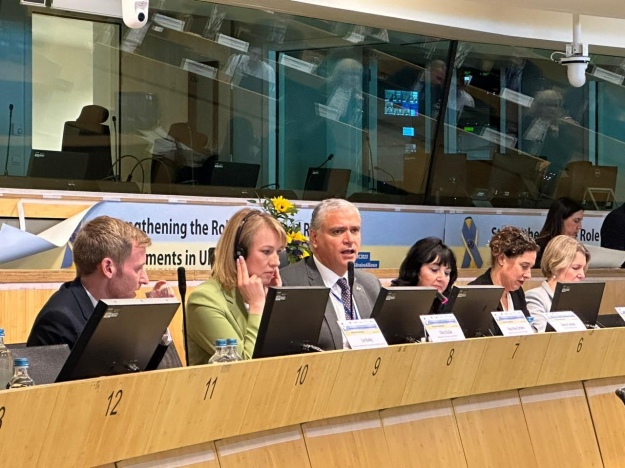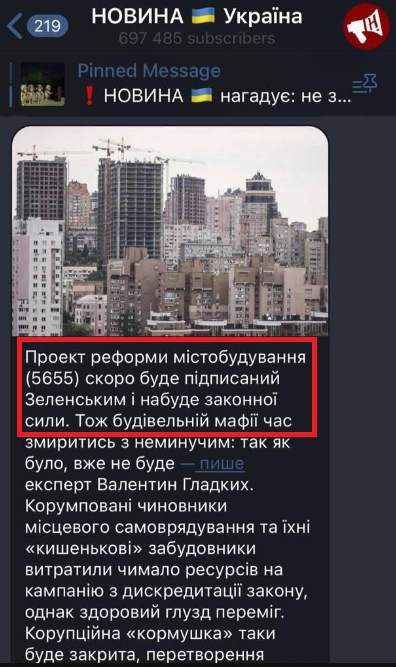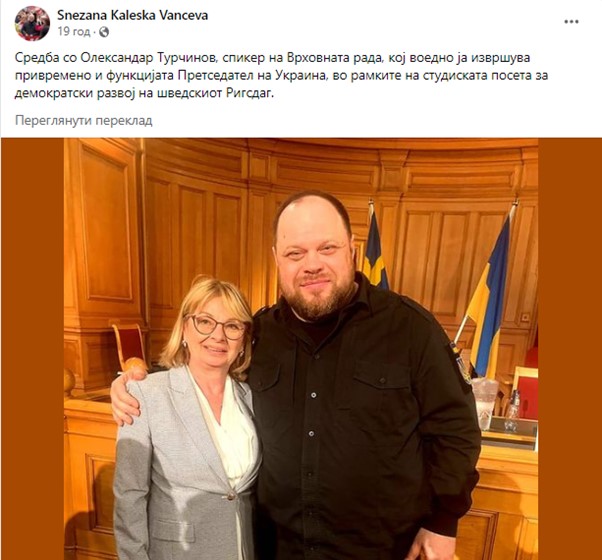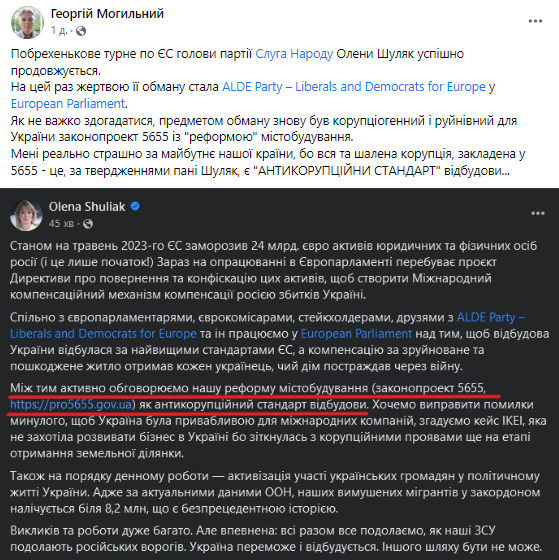The head of the "Servant of the People" party, Olena Shulyak, lobbies urban planning "reform" at the international level
One significant event took place recently that unfortunately didn't receive any attention from the media. The leader of the "Servant of the People" party, Olena Shulyak, spoke at the European Committee of the Regions meeting. The event's theme was ‘Strengthening local self-governance and effective decentralization as part of the reconstruction of Ukraine’.

The speech of the leader of the Servant of the People party, Shulyak, deserves particular attention, if only because she once again turned it into a tool for lobbying the urban development "reform" favored by unscrupulous developers. Before this speech, she appeared noticeably nervous, as seen in the event's video recording.
Considering that the urban development "reform" was not supposed to be discussed at this event, Shulyak tried to emphasize the advantages of her initiative at the end of her speech. However, the moderator quickly pointed out that it exceeded the time limits (in the video, at 16 minutes and 48 seconds). And who, if not a member of parliament, should understand how the agenda works?
So, what did the leader of the presidential party talk about?
"Now, everything related to permitting documentation, the introduction of such large-scale projects into operation, at the state level, does not have a corruption factor. But more than 80% of permit documents are associated precisely with local self-government bodies... And perhaps you have heard about 5655... This draft law completely eradicates corruption at the local level," reassured Shulyak.
She added that this project has significant support from government officials such as Fedorov, Kubrakov, and small towns. Of course, not a word was mentioned about the opposition of civil society, experts, and the Association of Cities due to significant corruption risks in the proposed ''reform''. Nor was it mentioned that Ms. Shulyak, as the parliament committee chair, did not involve key stakeholders in the legislative process and instead went to the hospital to sort out issues with the wounded soldier Oleh Symoroz. Symoroz criticized the 5655 draft law.
She should have mentioned that President Volodymyr Zelensky has been ignoring and not signing this draft law for half a year. After this event, the absence of the President's signature was confirmed in the interview by the Deputy Head of the President's Office, Oleksiy Kuleba.
So, the question arose in the corridors after the party leader's speech: is this the President's position?
What can be said here? Of course, this is not the President's position. But that doesn't stop some people. And no matter what the Deputy Head of the President's Office Kuleba says, someone on anonymous Telegram channels knows better. They report, "Zelensky will soon sign the urban development reform draft law, and it will come into power."

The CHESNO Movement has already investigated how anonymous Telegram channels collaborate with members of parliament and will soon publish research results. We are aware of the rates charged by Telegram channels for disseminating materials.
Furthermore, in the corridors, international partners were questioning who Kubrakov and Fedorov were. Of course, it's regrettable for me, but we see real cases where some European politicians may think that former acting president Oleksandr Turchynov is still running the country.

Indeed, when preparing a speech for an international event, it is essential to know your audience. Surnames that are familiar to Ukrainians may be unfamiliar to Europeans. However, if European or American politicians may need to learn the names of all Ukrainian colleagues, they are already well informed about the risks associated with 5655. The civil society sector, the Association of Ukrainian Architects, and other stakeholders have effectively communicated these risks, including to the embassies of the G-7 countries.
Of course, it would have been possible to inform international partners that the law had undergone anti-corruption expertise by the National Agency for Corruption Prevention (NAZK) and avoid mentioning Kubrakov or Fedorov. However, no anti-corruption expertise was conducted on the law's final version.
And such events, where Shulyak attempts to push for 5655 internationally, are common. The same occurred during the meeting with the ALDE Party.

After Shuliak's speech, the CHESNO Movement requested Mrs. Shuliak, who is the chair of the parliament committee, the answers to the following questions:
- Which organization or institution did you represent at this event?
- What were the intended outcomes of your participation in the event, and were they achieved?
- Who did you officially coordinate your participation and the above statements within Ukraine at the international event?
We also requested a link to the publication or a copy of the research that formed the basis of the corruption level indicators mentioned in your presentation. We are curious to examine the materials and data used in your report presented to an international audience. Once we receive the answers to these questions, we will publish them.
Overall, some speakers who claim to represent Ukraine's interests are even using international events to lobby for the interests of unscrupulous developers.
One aspect that deserves special attention is that Olena Shuliak is the head of the committee responsible for local self-government. However, her actions at this event worked against local self-government. It is undeniable that there is a corrupt component at the local level when it comes to construction. Nobody disputes that. However, draft law 5655 does not address the problem of corruption at the local level; instead, it hands over the fate of communities to developers, as written in the Mirror of the Week publication. Therefore, the author's statements about the draft law are manipulative.
It is also vital to examine the claim made by Shuliak about the absence of corruption at the state level. For this, we consulted Georgiy Mohylnyi, an expert on urban planning issues.
"This is a typical story of 'their cunning spies' versus 'our heroic intelligence agents.' In this case, the old State Architectural and Construction Inspection (SACI) is a spy. In contrast, the new State Inspection of Architecture and Urban Planning (SIAUP) plays the role of intelligence agents. To understand the situation, it is important to know a few key things. Developers and Shuliak launched an information campaign claiming that SACI was corrupt. And that's true; it's just that Shuliak and the developers did not influence it. However, SIAUP, which they created and promoted as a successful case in fighting corruption, is not better. The construction lobby controls it."
Mohylnyi points out that the refusals issued by SACI are identical to those now issued by SIAUP. The only difference is that SACI was called corrupt, while SIAUP positions itself as countering illegal construction. This was the case, for example, on Makarivska Street in the capital.
An even more scandalous story unfolded with the construction of the 4U residential complex in Kyiv:
"At that time, SACI refused to issue permits for illegal construction contrary to Kyiv's general plan and urban planning conditions. However, SIAUP did not issue a permit but registered a 'modification' and transformed the administrative building into a residential complex. They should have refused to modify the project because the city had granted permission for an administrative building, not a residential complex," explains Mohylnyi.
The Committee on State Construction, which mysteriously dropped the word "state" from its name, seems to have become a committee for developers. This is especially evident in the fact that Shuliak needs to address the problems of local self-government, particularly regarding the travel restrictions imposed on local council deputies when it comes to going abroad. This restriction, introduced by a government resolution, primarily limits the rights of female deputies.
The CHESNO Movement's appeal on this matter to Shuliak as the committee chair. We are still waiting for a reply.
It is very disappointing that the leader of a party who is supposed to protect women's leadership and develop the party, and the committee leader responsible for ensuring the quality development of local self-government cannot handle these challenges. She would have achieved significant success if she had worked on solving these problems as diligently as promoting the urban planning "reform" that benefits developers.
Iryna Fedoriv, editor-in-chief of CHESNO Movement
